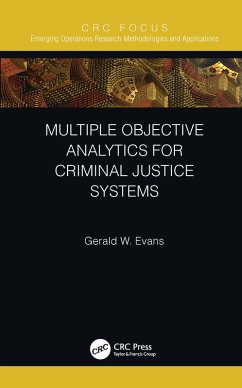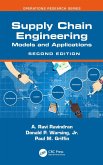Gerald W. Evans
Multiple Objective Analytics for Criminal Justice Systems (eBook, ePUB)
21,95 €
21,95 €
inkl. MwSt.
Sofort per Download lieferbar

11 °P sammeln
21,95 €
Als Download kaufen

21,95 €
inkl. MwSt.
Sofort per Download lieferbar

11 °P sammeln
Jetzt verschenken
Alle Infos zum eBook verschenken
21,95 €
inkl. MwSt.
Sofort per Download lieferbar
Alle Infos zum eBook verschenken

11 °P sammeln
Gerald W. Evans
Multiple Objective Analytics for Criminal Justice Systems (eBook, ePUB)
- Format: ePub
- Merkliste
- Auf die Merkliste
- Bewerten Bewerten
- Teilen
- Produkt teilen
- Produkterinnerung
- Produkterinnerung

Bitte loggen Sie sich zunächst in Ihr Kundenkonto ein oder registrieren Sie sich bei
bücher.de, um das eBook-Abo tolino select nutzen zu können.
Hier können Sie sich einloggen
Hier können Sie sich einloggen
Sie sind bereits eingeloggt. Klicken Sie auf 2. tolino select Abo, um fortzufahren.

Bitte loggen Sie sich zunächst in Ihr Kundenkonto ein oder registrieren Sie sich bei bücher.de, um das eBook-Abo tolino select nutzen zu können.
Criminal justice systems are complex and difficult to design and operate. This is due to their many interacting parts, and dynamic and probabilistic nature, as well as their interfaces with other systems. This book reviews the use of analytics to address issues in criminal justice systems and the various data sources.
- Geräte: eReader
- ohne Kopierschutz
- eBook Hilfe
- Größe: 4.13MB
Andere Kunden interessierten sich auch für
![Multiple Objective Analytics for Criminal Justice Systems (eBook, PDF) Multiple Objective Analytics for Criminal Justice Systems (eBook, PDF)]() Gerald W. EvansMultiple Objective Analytics for Criminal Justice Systems (eBook, PDF)21,95 €
Gerald W. EvansMultiple Objective Analytics for Criminal Justice Systems (eBook, PDF)21,95 €![Tomorrow's Systems Engineering (eBook, ePUB) Tomorrow's Systems Engineering (eBook, ePUB)]() Howard EisnerTomorrow's Systems Engineering (eBook, ePUB)21,95 €
Howard EisnerTomorrow's Systems Engineering (eBook, ePUB)21,95 €![Operations Research and Systems Engineering (eBook, ePUB) Operations Research and Systems Engineering (eBook, ePUB)]() Howard EisnerOperations Research and Systems Engineering (eBook, ePUB)21,95 €
Howard EisnerOperations Research and Systems Engineering (eBook, ePUB)21,95 €![Mathematical Modelling (eBook, ePUB) Mathematical Modelling (eBook, ePUB)]() Pramod BelkhodeMathematical Modelling (eBook, ePUB)52,95 €
Pramod BelkhodeMathematical Modelling (eBook, ePUB)52,95 €![Tomorrow's Systems Engineering (eBook, PDF) Tomorrow's Systems Engineering (eBook, PDF)]() Howard EisnerTomorrow's Systems Engineering (eBook, PDF)21,95 €
Howard EisnerTomorrow's Systems Engineering (eBook, PDF)21,95 €![Market Assessment with OR Applications (eBook, ePUB) Market Assessment with OR Applications (eBook, ePUB)]() Adarsh AnandMarket Assessment with OR Applications (eBook, ePUB)48,95 €
Adarsh AnandMarket Assessment with OR Applications (eBook, ePUB)48,95 €![Supply Chain Engineering (eBook, ePUB) Supply Chain Engineering (eBook, ePUB)]() A. Ravi RavindranSupply Chain Engineering (eBook, ePUB)120,95 €
A. Ravi RavindranSupply Chain Engineering (eBook, ePUB)120,95 €-
-
-
Criminal justice systems are complex and difficult to design and operate. This is due to their many interacting parts, and dynamic and probabilistic nature, as well as their interfaces with other systems. This book reviews the use of analytics to address issues in criminal justice systems and the various data sources.
Dieser Download kann aus rechtlichen Gründen nur mit Rechnungsadresse in A, B, BG, CY, CZ, D, DK, EW, E, FIN, F, GR, HR, H, IRL, I, LT, L, LR, M, NL, PL, P, R, S, SLO, SK ausgeliefert werden.
Produktdetails
- Produktdetails
- Verlag: Taylor & Francis
- Seitenzahl: 156
- Erscheinungstermin: 22. Dezember 2020
- Englisch
- ISBN-13: 9781000352931
- Artikelnr.: 60852278
- Verlag: Taylor & Francis
- Seitenzahl: 156
- Erscheinungstermin: 22. Dezember 2020
- Englisch
- ISBN-13: 9781000352931
- Artikelnr.: 60852278
- Herstellerkennzeichnung Die Herstellerinformationen sind derzeit nicht verfügbar.
Gerald W. Evans is Professor Emeritus in the Department of Industrial Engineering at the University of Louisville (UL). His research and teaching interests lie in the areas of multiciteria decision analysis, simulation modeling and analysis, optimization, logistics and project management.
Previous positions include Industrial Engineer for the Department of the Army, and Senior Research Engineer for General Motors Research Laboratories. He has also served as an ASEE Faculty Fellow at NASA's Langley Research Center and Kennedy Space Center.
Dr. Evans received his BS in Mathematics in 1972, his MS in Industrial Engineering in 1974, and his PhD in Industrial Engineering in 1979, all from Purdue University.
Dr. Evans has served as Principal Investigator or Co-Principal Investigator on over $5 million of funded research from organizations such as the National Science Foundation, the Defense Logistics Agency, NASA, the National Institute for Hometown Security, Louisville Metro Government, General Electric, and United Parcel Services among other organizations. In addition, he has done consulting work in the areas of simulation modeling and analysis, project management, and economic analysis for a variety of organizations.
He has published approximately 100 papers in various journals and conference proceedings. His paper: "An Overview of Techniques for Solving Multiobjective Mathematical Programs," published in 1984 was listed as one of the most cited publications in Management Science over the last 50 years (from the 2004 commemorative CD: Celebrating 50 years of Management Science, INFORMS Publication). In addition, his co-authored paper: S.J. Ellspermann, G.W. Evans, and M. Basadur, "The Impact of Training on the Formulation of Ill Structured Problems," Omega 35:2, pp. 221-236, April 2007 received the 12th Annual Citation of Excellence Award as one of the top 50 management articles out of 15,000 articles published in 2007 (Emerald Management Reviews), 2008.
Dr. Evans is the author of Multiple Criteria Decision Analysis for Industrial Engineering: Methodology and Applications, CRC Press, Taylor and Francis Group, Boca Raton, FL, 2017, and co-editor of the book: Analytics, Operations, and Strategic Decision Making in the Public Sector, Hershey, PA.: IGI Global, 2019. He has also served as co-editor of the Proceedings of the Winter Simulation Conference in 1993 and 1999, and of a special issue of Computers and Industrial Engineering entitled "Multi-Criteria Decision Making in Industrial Engineering" (November, 1999). He has been a reviewer for approximately 25 different journals, an Associate Editor for the Institute of Industrial Engineers (IIE) Transactions, a Director of the Operations Research Division of IIE, and a Vice President of IIE.
In addition, he has directed or co-directed the research of approximately 90 masters' students and 20 doctoral students while at the University of Louisville.
Dr. Evans has received the Fellow Award and the Operations Research Division Award from Institute of Industrial and Systems Engineering, the Moving Spirit Award from INFORMS for his work with the UL INFORMS Student Chapter, the Dean's Award for Outstanding Graduate Teaching; and he was a University of Louisville nominee for Outstanding Faculty of Adult Learners for Kentukiana Metroversity Inc. He is listed in American Men and Women of Science, Who's Who in Engineering, and Who's Who in America.
Previous positions include Industrial Engineer for the Department of the Army, and Senior Research Engineer for General Motors Research Laboratories. He has also served as an ASEE Faculty Fellow at NASA's Langley Research Center and Kennedy Space Center.
Dr. Evans received his BS in Mathematics in 1972, his MS in Industrial Engineering in 1974, and his PhD in Industrial Engineering in 1979, all from Purdue University.
Dr. Evans has served as Principal Investigator or Co-Principal Investigator on over $5 million of funded research from organizations such as the National Science Foundation, the Defense Logistics Agency, NASA, the National Institute for Hometown Security, Louisville Metro Government, General Electric, and United Parcel Services among other organizations. In addition, he has done consulting work in the areas of simulation modeling and analysis, project management, and economic analysis for a variety of organizations.
He has published approximately 100 papers in various journals and conference proceedings. His paper: "An Overview of Techniques for Solving Multiobjective Mathematical Programs," published in 1984 was listed as one of the most cited publications in Management Science over the last 50 years (from the 2004 commemorative CD: Celebrating 50 years of Management Science, INFORMS Publication). In addition, his co-authored paper: S.J. Ellspermann, G.W. Evans, and M. Basadur, "The Impact of Training on the Formulation of Ill Structured Problems," Omega 35:2, pp. 221-236, April 2007 received the 12th Annual Citation of Excellence Award as one of the top 50 management articles out of 15,000 articles published in 2007 (Emerald Management Reviews), 2008.
Dr. Evans is the author of Multiple Criteria Decision Analysis for Industrial Engineering: Methodology and Applications, CRC Press, Taylor and Francis Group, Boca Raton, FL, 2017, and co-editor of the book: Analytics, Operations, and Strategic Decision Making in the Public Sector, Hershey, PA.: IGI Global, 2019. He has also served as co-editor of the Proceedings of the Winter Simulation Conference in 1993 and 1999, and of a special issue of Computers and Industrial Engineering entitled "Multi-Criteria Decision Making in Industrial Engineering" (November, 1999). He has been a reviewer for approximately 25 different journals, an Associate Editor for the Institute of Industrial Engineers (IIE) Transactions, a Director of the Operations Research Division of IIE, and a Vice President of IIE.
In addition, he has directed or co-directed the research of approximately 90 masters' students and 20 doctoral students while at the University of Louisville.
Dr. Evans has received the Fellow Award and the Operations Research Division Award from Institute of Industrial and Systems Engineering, the Moving Spirit Award from INFORMS for his work with the UL INFORMS Student Chapter, the Dean's Award for Outstanding Graduate Teaching; and he was a University of Louisville nominee for Outstanding Faculty of Adult Learners for Kentukiana Metroversity Inc. He is listed in American Men and Women of Science, Who's Who in Engineering, and Who's Who in America.
1. Criminal Justice Systems in the United States: Basic Concepts. 2.
Analytics and Criminal Justice Systems. 3. Using Analytics to Address
Programs and Policies Associated with Criminal Justice Systems. 4. Using
Analytics to Analyze and Improve State and Federal Laws.
Analytics and Criminal Justice Systems. 3. Using Analytics to Address
Programs and Policies Associated with Criminal Justice Systems. 4. Using
Analytics to Analyze and Improve State and Federal Laws.
1. Criminal Justice Systems in the United States: Basic Concepts. 2.
Analytics and Criminal Justice Systems. 3. Using Analytics to Address
Programs and Policies Associated with Criminal Justice Systems. 4. Using
Analytics to Analyze and Improve State and Federal Laws.
Analytics and Criminal Justice Systems. 3. Using Analytics to Address
Programs and Policies Associated with Criminal Justice Systems. 4. Using
Analytics to Analyze and Improve State and Federal Laws.







